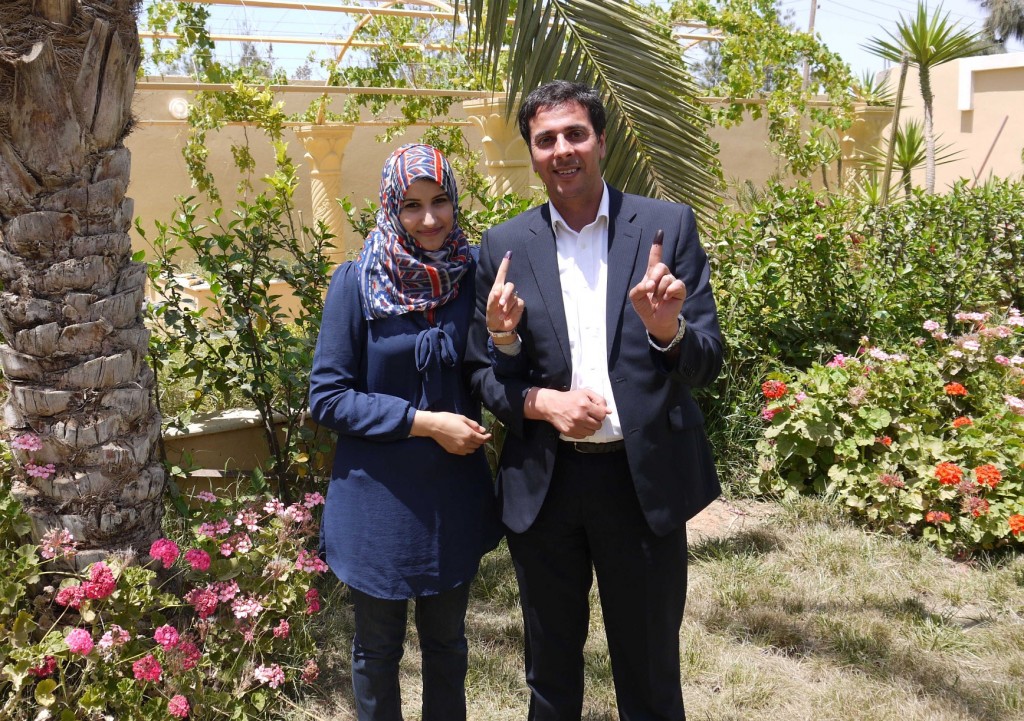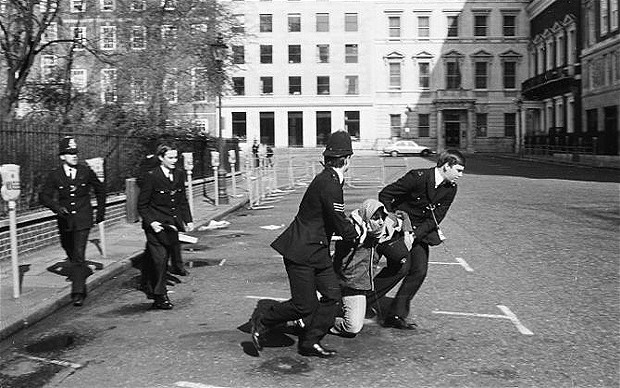By George Grant.
Benghazi, 28 June:
Remarkable new information emerges about one of the survivors of the shooting outside the Libyan Embassy in . . .[restrict]London in 1984

“She can’t have been more than six feet away; standing directly between me and the embassy, and she had a big smile on her face. I remember that smile very well.” Recalling the final moments of WPC Yvonne Fletcher, Dr Adel Almansouri puts his hand to the scar on his upper right thigh, marking the place where a bullet brought him down outside the Libyan Embassy in 1984.
“Moments after seeing that smile I heard the sound; an automatic machine gun firing. Everyone was panicking; jumping on top of one another. I felt something warm in my leg. The police were yelling at us ‘run, ******* run!’ I tried to move but instead I fell. I couldn’t run, and that’s when I realised they’d hit me too.”
On that fateful morning in April 1984, Almansouri was just 18 years old, studying in England on a scholarship from Libya. He had heard there was to be a demonstration against his country’s oppressive ruler, Muammar Qaddafi, and decided to join the bus travelling to the Libyan Embassy in London where the protest was to be held.
“We were all very frightened”, he remembers. “We knew that if anyone from the embassy recognised us then not only our own lives, but those of our families back in Libya could be in danger. But we felt even more strongly about what Qaddafi was doing, about the persecution and murder of political prisoners, and the total absence of democracy, so we decided to go.”
Twenty-eight years later, sitting in the sunshine-bathed garden of his house in Benghazi, all this seems a world away. Now, Almansouri is headmaster of the International School of Benghazi, a new private college established by him on 1 October 2011, in the closing days of the pro-democracy uprising that finally ended Qaddafi’s 42-year rule. He also stood as a candidate in the Benghazi Local Council elections last month, the city’s first taste of democracy before nationwide elections scheduled for 7 July 2012.
With 43 candidates having run for the four seats in his district alone, one of 11 across the city, Almansouri’s bid for election was unsuccessful, but he isn’t despondent. “I am just grateful to have had the opportunity to have exercised my democratic rights at all, which I wouldn’t have done had it not been for Yvonne Fletcher. That shooter hit 11 of us in total, 10 Libyans and WPC Fletcher. She was the only one who died. But I do not believe the killer was aiming for her; he was shooting at the Libyan protesters, not the British police. The bullet that killed her was meant for me. YvonneFletcher saved my life”.

During the Qaddafi era British detectives made six trips to Tripoli but the dictator always insisted that any trial would be in Libya. No one was charged over Fletcher’s murder.
With Qaddafi now gone, the new government in Tripoli has allowed British detectives to enter Libya and renew their investigation into Fletcher’s death. Scotland Yard said that their two detectives discussed a joint investigation this month with the Libyan authorities.
Back in Benghazi, Almansouri ushers me round to his laptop and shows me a picture of what looks like a young woman, with a scarf concealing most of her head and face, being carried away by two British policemen. “That’s not a woman, that’s me!” he laughs, “just after I’d been shot. I had long hair in those days and made sure I was well disguised. On the bus down from Manchester, where I was a student, me and a friend of mine even swapped jackets, though that didn’t stop either of us from being hit”.
What Almansouri’s disguise did do, however, was prevent him from being discovered by the Libyan authorities in the aftermath of the shooting. “The British police were fantastic”, he says. “After three months in Westminster hospital, they knew that my Libyan sponsors would want to know where I was. If they discovered that I was part of that protest, then there would have been very serious consequences.”
And so it was that the police embarked upon an elaborate piece of subterfuge to hide the true nature of what had happened from Almansouri’s patrons at the Libyan Embassy. “We decided to pretend that I had spent the last three months in Rome looking after my sick mother. They took mypassport and arranged for both a visa to Italy and a re-entry visa to the UK to be put inside. They even got me to write postcards, which were taken all the way to Italy and then posted back to England to add authenticity to my story!”
When he did finally return to Manchester, however, questions still needed to be answered. “The Libyan embassy had gone crazy trying to find out where I was”, he recalls. Not only that, but they had suspended his sponsorship, meaning he had no access to funds. “I had to go to the embassy, show them my passport, and answer a lot of questions.”
Although the Libyan embassy was closed down shortly after the shooting, the Saudi embassy maintained a “Libyan Affairs” section in an office in Harley Street where Libyans still in the UK could find representation.
After that, his sponsorship was restarted, and Almansouri was able to complete his course in Manchester, before going on to gain a degree in Mechanical Engineering from the Nottingham University and then a Masters and finally a PhD in Mechatronics from Loughborough University in 1997.
Almansouri remained in England for a further two years, starting his own import and export business, before returning to Libya to visit his family in 1999, whereupon he was promptly thrown in jail.
“Thanks to God, they only held me for 16 days, but it felt like an eternity. They never gave me an explanation as to why I was imprisoned, but I’m sure it was related to that three-month absence in 1984”. Almansouri was held in Libya for a further two-and-a-half months, before being allowed to return to England in June 1999.
He stayed in England for a further seven years, become first an ICT teacher and then head of department at Sherwood Hall school in Mansfield. Having returned to Libya in 2006 to be with his family, Almansouri was fortunate – as a Libyan with British citizenship – to be on one of the last Foreign & Commomwealth Office flights out of Tripoli following the outbreak of the revolution last February.
Now Almansouri says he is in Libya to stay. “At last, Libya is a free country, and I am able to make a life here. And it is thanks to Yvonne Fletcher that I have a life to live.”
[/restrict]










